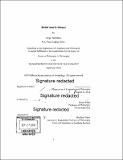Belief and evidence
Author(s)
Schultheis, Ginger (Virginia Kathleen)
DownloadFull printable version (4.693Mb)
Other Contributors
Massachusetts Institute of Technology. Department of Linguistics and Philosophy.
Advisor
Roger White.
Terms of use
Metadata
Show full item recordAbstract
Chapter 1, 'Living on the Edge: Against Epistemic Permissivism,' argues that Epistemic Permissivists face a special problem about the relationship between our first- and higher-order attitudes. They claim that rationality often permits a range of doxastic responses to the evidence. Given plausible assumptions about the relationship between your first- and higher-order attitudes, you can't stably be on the edge of the range, so there can't be a range at all. Permissivism, at least as it has been developed so far, can't be right. I consider some new ways of developing Permissivism, but each has problems of its own. Chapter 2, 'Belief and Probability,' argues that rational belief doesn't reduce to subjective probability. Under the right circumstances, I argue, acquiring conflicting evidence can defeat your entitlement to believe a certain hypothesis without probabilistically disconfirming that hypothesis. I consider three probabilistic theories of rational belief-a simple threshold view, Hannes Leitgeb's stability theory, and a new theory involving imprecise credence-and show that none of them can account for the cases I describe. Chapter 3, 'Can We Decide to Believe?', takes up the question of whether we can decide to believe. There are two main arguments for the conclusion that believing at will is impossible, which I call the retrospective argument and the aim-of-belief argument, respectively. Neither, I argue, demonstrates that believing at will is impossible in all cases. The retrospective argument leaves open the possibility of believing at will in acknowledged permissive cases; the aim-of-belief argument leaves open the possibility of believing at will when credal attitudes are imprecise.
Description
Thesis: Ph. D. in Philosophy, Massachusetts Institute of Technology, Department of Linguistics and Philosophy, 2018. Cataloged from PDF version of thesis. Includes bibliographical references (pages 76-80).
Date issued
2018Department
Massachusetts Institute of Technology. Department of Linguistics and PhilosophyPublisher
Massachusetts Institute of Technology
Keywords
Linguistics and Philosophy.